

The Florida Immigrant Coalition issues travel warning for Florida

A national advisory warning immigrants on travel to Florida has been issued by The Florida Immigrant Coalition for what the group said was unsafe conditions for immigrants and their loved ones.
"Due to unconstitutional laws being passed in the state aiming to criminalize immigration and invite harassment of people without a regulated immigration status, every county in Florida now poses a high risk of unlawful detainment and potential family separation based on racial profiling," a media release issued by the group said. "Not only is this an attack on immigrants, but U.S. citizens and people who hold other migratory statuses could be charged with a felony if traveling or housing themselves with someone without a regulated immigration status."
The group said Governor Ron DeSantis is exercising an overreach of his power by criminalizing residents of other states who have legally issued licenses given to them by their states’ governments after meeting the requirements.
“We cannot in good conscience advise people to travel to a state where pretty soon they may be harassed by law enforcement and told their legally issued driver's licenses are invalid which could trigger a sequence of events where there is a potential for that person to never return home to their state but instead be swept up by immigration detention,” Adriana Rivera, Communications Director for the Florida Immigrant Coalition, said. “With political leaders in the state creating an increasingly hostile atmosphere for non-white citizens, many local officials are now feeling pressured to comply with unconstitutional directives that call into question their commitment to the safety of all those who reside in their communities.”
The Florida Immigrant Coalition is a statewide collective of more than 65 member organizations and over 100 allies, founded in 1998 and formally incorporated in 2004.
Details of the advisory are attached and can be found at floridatraveladvisory.com .
“There is nothing more important than the safety of our communities and it is clear that our rights and civil liberties are under attack in Florida,” Rivera said. “For immigrants and people of color, it is vital that you understand that traveling to the state of Florida right now could put you and your family in immediate danger of unlawful detention and harassment within the state.”
A similar advisory was urged earlier in April by the Florida State Chapter of the National Association for the Advancement of Colored People to its national board.
In addition to the threat of detainment, recent changes in Florida call into question the availability of emergency medical or public safety services for all those without a regulated immigration status and with legally issued driver’s licenses from other states as a form of identification.
If travel to the state cannot be avoided, immigrants and people of color should be aware of resources that are available to them should they find themselves facing legal jeopardy.
“We are urging everyone who must travel to Florida to make a Safety Plan for themselves and their families before they arrive in the state,” advised David Metellus, Director of Policy and Politics for the Florida Immigrant Coalition. “All those visiting Florida should memorize the phone number of a licensed civil liberties or immigration attorney, discuss a plan with loved ones regarding care or custody of children, pets, and belongings, and be aware of the resources available to them through organizations on the ground dedicated to protecting their safety.”
WGCU is your trusted source for news and information in Southwest Florida. We are a nonprofit public service, and your support is more critical than ever. Keep public media strong and donate now. Thank you.
Top 5 Things to Know About SB 1718, Florida’s New Immigration Law

The Legislature passed Senate Bill (SB) 1718 in the 2023 session, which covers over a dozen policy areas that target Floridians without a documented immigration status. SB 1718 began as a proposal from Gov. Ron DeSantis. Most of his recommendations — except for a repeal of Florida’s tuition equity law [1] — made it into the final bill, despite myriad proposed amendments and suggestions. However, Florida Policy Institute and partners’ collective advocacy led to substantial improvements on two key provisions in the human smuggling language and the E-Verify mandate. [2]
The law, which goes into effect July 1, 2023, [3] is already causing fear and confusion among immigrants, employers, health care professionals, and others. Below, FPI summarizes five things that people should know about SB 1718, complementing ongoing community efforts to educate Floridians about the measure’s most notable provisions.
1.The law does not allow hospitals to reveal someone’s immigration status or refuse them care.
Starting July 1, all hospitals that accept Medicaid — there are 323 of them in Florida — must ask admitted patients and emergency room visitors their immigration status. However, patients can decline to share whether they are immigrants or not. Hospitals must also tell patients that their individual immigration status will not be shared with authorities or impact care.
However, patients can decline to share whether they are immigrants or not.
Quarterly, hospitals must report the number of patients served and costs of care to the state, broken down by categories: 1) Is a U.S. citizen/lawfully present, 2) Is not lawfully present, or 3) Declined to answer. The data reported to the state only shares collective patients served with no personally identifiable information.
2. The law impacts undocumented workers and their employers.
Two of the sections in SB 1718 apply to workers without a “lawful” status (i.e., undocumented immigrants). The first punishes both workers and employers:
- If undocumented workers falsify information to obtain employment, they will be subject to a third-degree felony (up to a $5,000 fine or five years in prison).
- If employers knowingly hire or recruit undocumented workers, they are subject to penalties, including one-year probation with the Department of Economic Opportunity; repaying of economic development incentives; and additional penalties for subsequent violations. [4]
New E-Verify regulations
The second section requires all employers with more than 25 employees to use the federal E-Verify system, an internet-based system operated by the U.S. Department of Homeland Security, to ensure new employees — people hired July 1, 2023, or later — are legally authorized to work in the United States. While E-Verify is not required for those hired before July 1, 2023, if an employer learns that a current worker is undocumented, they must fire them.
The new law’s E-Verify provisions do not impact workers hired for temporary positions (nor do they apply to independent contractors).
Starting July 2024, if an employer fails to use the E-Verify system three times within two years, they will be fined $1,000 per day and have their business licenses suspended until they comply.
3. The law bans transporting undocumented immigrants into Florida, not within or out of the state.
Under the new law, anyone who transports into the state someone they know (or should have known) is an immigrant without a documented status can be charged with a felony . Each undocumented person transported triggers a separate felony count, either a third- or second-degree, depending on the nature of the crime. While prior versions of the policy also banned transporting within the state and harboring or concealing immigrants, that was left out of the final bill.
A person could be charged with a third-degree felony with up to a $5,000 fine or five years in prison for a first offense where they transported into Florida fewer than five undocumented immigrants at a time.
Someone could be charged with a second-degree felony — up to a $10,000 fine or 10 years in prison — for a subsequent offense; transporting five or more undocumented immigrants at a time; or transporting an undocumented child (under age 18) into the state.
4. The law does not prevent local governments from passing community identification laws.
Starting July 1, local governments can no longer fund programs issuing community identification (ID) to Floridians who cannot prove they are “lawful” residents (i.e., undocumented immigrants). In practice, this means supporters of community/municipal ID programs will need to identify private funding to start or continue those programs (e.g., private foundation grants, individual donations). This is intended to curb local programs that have popped up to provide IDs to those who cannot obtain a state ID or driver’s license. [5]
This does not negate existing programs or prevent localities from passing new ones; it only prevents localities from funding said programs (directly or through grants to service providers).

5. The law invalidates driver’s licenses for undocumented immigrants from up to 19 states.
When the new law takes effect, undocumented immigrants with out-of-state driver’s licenses issued without proof of “lawful presence” are prohibited from driving in Florida. This includes people working for a federal government contractor who have these types of licenses. If found driving with an invalid license, undocumented immigrants will be issued citations. Florida must maintain and post an updated list of states issuing invalid licenses. Currently, 19 states, D.C., and Puerto Rico issue such licenses.
When the new law takes effect, undocumented immigrants with out-of-state driver’s licenses issued without proof of “lawful presence” are prohibited from driving in Florida.
Since law enforcement can already detain and report undocumented immigrants to federal authorities during traffic stops, they may do so when pulling someone over with an invalid out-of-state license.
This may not impact drivers from all the states with inclusive driver’s license laws, as SB 1718 states that invalid licenses are either 1) exclusively issued to undocumented immigrants or 2) with a marking that indicates the license is different than the standard issue. Most states with inclusive driver’s licenses do not fall within either of these categories. [6]
[1] The governor’s proposal included a repeal of Florida’s bipartisan 2014 tuition equity law. This popular law requires that colleges, universities, and postsecondary institutions waive out-of-state tuition for certain undocumented students who graduated from a Florida high school. This provision was left out of the final legislation (SB 1718), thanks in large part to the work of advocacy groups and undocumented youth committed to preserving tuition fairness.
[2] The original legislation had much broader language and punishments that included felony charges for transporting undocumented immigrants within the state and harboring, concealing, or shielding them from protection. FPI, faith groups, the business community, and others pushed back early in the legislative session, pointing out this could mete out punishment to almost any Floridian who learned of someone’s status. As a result, the final legislation only makes it a felony to transport people who are undocumented into the state. As for E-Verify, the original Senate bill would have applied to *all* private employers, while the final legislation only applies to those with 25+ employees; the fines were changed to target repeated violations and give employers opportunities to correct the issue, and penalty tiers were added for noncompliance based on the number of undocumented workers businesses employed. Finally, the law applies to employees with a permanent position, so independent contractors do not have to be run through E-Verify. (They would have had to upon contract renewal under the original bill.)
[3] Overall, SB 1718 goes into effect July 1, 2023. There are two provisions, however, that will not impact Floridians until 2024 or later. Fines of up to $1,000 for employers who fail to use E-Verify three times within two years do not take effect until July 1, 2024, but the rest of the employment verification provisions take effect July 1 of this year. The provision on undocumented law graduates no longer being eligible to practice as lawyers in the state (not discussed in this publication) does not go into effect until November 1, 2028.
[4] Fines for subsequent violations are tiered based on the number of undocumented workers employed. One to 10 undocumented workers—suspension of all business licenses for up to 30 days; 11 to 50 workers—suspension of all business licenses for up to 60 days; 50-plus workers—revocation of all business licenses.
[5] At least four cities and four counties have passed community ID ordinances, including Bell Glade, Gainesville, Tamarac, West Palm Beach; and Alachua, Broward, Miami-Dade, and Palm Beach Counties.
[6] Based on email correspondence between Florida Policy Institute, National Immigration Law Center, and policy analysts in states with driver’s licenses for undocumented immigrants.
American Rescue Plan Act Changes. The American Rescue Plan Act of 2021 extended PEUC and PUA benefits through the week ending September 6, 2021. It also increased the maximum duration of PEUC benefits ($300 a week) to 53 weeks and the maximum duration of PUA to 79 weeks. Although PEUC and PUA did not end until September 6, 2021, Florida withdrew from the Federal Pandemic Unemployment Compensation Program (FPUC) effective June 26, 2021. FPUC provided persons who were out of work due to COVID-19 with an additional $300 a week in unemployment insurance.
Reemployment Assistance weeks reverted to 12 effective January 1, 2022 . DEO determines the maximum number of weeks available to RA claimants based on a statutory formula that looks at the average unemployment rate for the most recent third calendar year quarter (i.e., July, August, and September). Based on the downturn in unemployment, the maximum number of weeks for RA reverted to 12 effective January 1, 2022.
RA work-search and work registration requirements reinstated on May 30, 2021. Persons filing an application for RA benefits beginning March 15, 2020, are not required to complete work registration in Employ Florida through May 29, 2021. In addition, work search requirements for individuals requesting benefits for the weeks beginning March 15, 2020, were also reinstated on May 30, 2021.
RA biweekly reporting requirements reinstated. Although previously waived, biweekly reporting was reinstated effective May 10, 2020 . DEO’s guide to claiming weeks is here .
Mobile app deployed. DEO has deployed a mobile app for RA applications.
DEO announces extended benefits . DEO announced implementation of Extended Benefits (EB) .
Resources and guidance. For a list of resources and guidance from the United States Department of Labor on unemployment insurance and COVID-19, go here .
For DEO’s “Reemployment Assistance Frequently Asked Questions and Additional Resources,” updated 12/30/2020, go here.
For DEO’s latest claims data, go here.
DCF opens offices. DCF has reopened its brick-and-mortar storefronts , which were previously closed due to coronavirus.
DCF adds call center numbers. DCF has added a call center number for Monday through Friday, from 7 a.m. to 6 p.m. Call center numbers now include 850-300-4323 , 866-762-2237, or TTY 1-800-955-8771.
Certification periods extended by 6 months only through August 2020. Certification periods for cash, food and medical assistance were extended by 6 months for individuals and families scheduled to recertify in April through August 2020. FNS’ approval of the SNAP extension for August is here . However, effective September 1, 2020, SNAP, TANF and Medicaid recertifications have been reinstated, although DCF says that no one will lose Medicaid due to recertification.
DCF allows phone interviews . Phone interviews are now being used for TANF cash and SNAP food assistance.
Mandatory work requirements suspended only through May 2021 . Under a directive from Governor DeSantis to waive work requirements for safety net programs, DCF waived work requirements for individuals participating in the Supplemental Nutrition Assistance Program (SNAP) and Temporary Assistance for Needy Families (TANF) through May 2021. To do this, DCF explains that it partnered with the Department of Economic Opportunity to apply “good cause” statewide for TANF and SNAP recipients who would otherwise be subject to participation in mandatory work requirements as a condition of receiving those benefits. Through May 2021, persons who were sanctioned in the past due to work requirements will be able to reapply and participate in SNAP or TANF again.
Work requirements were reinstated effective June 1, 2021.
Emergency allotments (EA) ended. DCF automatically supplemented SNAP allotments of current recipients up to the maximum for a household’s size for July 2021 . However, EA was discontinued beginning August 1, 2021.
The SNAP benefits increase by 15 percent ended in October 2021 . Floridians who participate in SNAP to put food on the table will receive a temporary 15 percent supplement to SNAP under COVID relief passed by Congress and extended by the American Rescue Plan Act through September 2021.
FNS permanently increases SNAP through revamp of the Thrifty Food Plan. Effective October 2021, FNS has mandated a permanent increase to SNAP through a revamp of the Thrifty Food Plan . DCF says that the increase amounts to about 6% for Floridians.
Time limits suspended . SNAP time limits are suspended during the COVID-19 public health emergency. No one in Florida should be barred from SNAP due to time limits, even if they exhausted their time limit in the past.
Florida granted waiver to allow families to purchase groceries online . DCF has been granted a federal waiver to permit the State of Florida to launch a pilot project statewide effective April 21, 2020, that allows families to purchase groceries online with their Electronic Benefit Transfer (EBT) card instead of going into stores.
- At present, participating retailers are Walmart, Amazon, Aldi, BJ’s Wholesale Club, and Publix. DCF cautions, however, that EBT cards cannot be used for delivery fees.
- For more information, see DCF’s questions and answers about online purchasing with SNAP.
No Medicaid terminations from March 2020 through the end of the federal public health emergency. The national public health emergency has existed since January 27, 2020 and has been renewed by the Secretary of the U.S. Department of Health & Human Services in 90-day increments since that time. The most recent renewal is effective January 16, 2022.
On March 31, 2020, AHCA alerted providers and DCF posted on the ACCESS website that:
- No Medicaid recipient will lose Medicaid eligibility during the COVID-19 public health emergency (unless the individual is no longer a state resident or request voluntary termination); under the newly enacted Families First Coronavirus Response Act, a state is prohibited from ending coverage for recipients enrolled as of March 18th for the duration of the public health emergency if the state opts to obtain an enhanced federal Medicaid match.
- AHCA is working to notify recipients who may have received a termination notice in the month of March that their benefits will be reinstated.
- An FAQ released by federal CMS provides some examples of Medicaid eligibility groups protected under these "no termination" requirements including: former foster care youth aging out when they turn 26; youth aging out of children's eligibility when they turn 19; individuals who become ineligible for SSI; individuals no longer qualifying for Qualified Medicare Benefits (QMB). In a May 5, 2020 update , CMS states that this “no termination” requirement also applies to medically needy individuals determined eligible during the public health emergency even if they do not continue to meet their monthly share of cost in subsequent months. This protection extends through the last day of the month the public health emergency ends.
- On October 28, 2020, federal CMS issued a new interim final rule weakening the continuous coverage, “no termination” requirement. In states like Florida that have opted to cover full benefits for lawfully residing children in the first 5 years after entry into the United States, once they turn 18, states are now required to limit their coverage to emergency services. In addition, states are now permitted to reduce optional benefits such as dental coverage or increase cost-sharing such as requiring nursing home residents to contribute more to their costs of care. But in Florida this type of change would require the Legislature to amend state Medicaid law.
Redetermination/recertification times are reinstated. As of October 1, 2020 AHCA's website is alerting recipients that the Department of Children and Families is now mailing letters for case reviews to check if a household is still eligible for Medicaid and/or Medically Needy. AHCA is urging people receiving these letters to take steps now to re-apply. But note, Medicaid coverage will not end during the COVID-19 Public Health Emergency. In January 2021 DCF conducted one-year “automated renewals” for people whose sole income is social security and SSI and are enrolled in an SSI-related Medicaid program (e.g., MEDS/AD, Medically Needy and Medicare Savings Programs). People getting VA income were not included in the automated renewal.
Extended application time. Effective with applications filed in February 2020, the time for submitting documentation required to process an application is extended for 120 days from the date of the application and eligibility will still be effective the first day of the month the application was received. Effective July 1, 2021, this policy has been rescinded. Medicaid applications submitted on or after July 1, 2021 may be denied on the 30th day after application or the day after verification information is due. Applications filed prior to July 1, will be allowed 120 days to provide requested verification to establish Medicaid eligibility.
Exclusion of additional unemployment payments in determining eligibility. The $600/week of additional unemployment insurance payments under the CARES Act will not be counted as income in determining Medicaid eligibility. (However, these payments will be counted as income in determining marketplace subsidy calculations.)
Coverage of Medicaid services during the state of emergency
- Coverage of all medically necessary services to COVID-19 testing and treatment.
- Waiver of limits on services that must be exceeded to maintain the health and safety of recipients diagnosed with COVID-19 or when necessary to maintain a recipient safely in their home
- Waiver of prior authorization requirements for hospital, physician, advanced practice registered nursing, physician assistant, home health services and durable medical equipment and supplies. As of June 19, 2020, AHCA reinstated prior authorization requirements for all of these services.
- Waiver of copayments for all services
- Waiver of limits on early prescription refills, except for controlled substances
- Coverage of a 90-day supply of maintenance prescriptions when available at the pharmacy
- Reimbursement of out-of-state providers providing medically necessary services to Florida Medicaid beneficiaries. As of July 1, 2021, the availability of provider “provisional enrollment” for in-state and out-of-state providers will end.
- 120 day extension of time to request fair hearings. As of July 1, 2021, the extended timeframe ends and the standard timeframes available to recipients to submit an appeal or request a hearing will be reinstated.
- Delay of fair hearings only in those instances when the recipient is continuing to receive services pending the outcome of the hearing
COVID-19 Vaccines for Medicaid Enrollees. In an executive order published March 16, 2021 Governor DeSantis revised the vaccine distribution plan, which applies to the general public including Medicaid enrollees, to lower the age requirement to 40 effective March 29, 2021 and then effective April 5, 2021 all Floridians are eligible to receive any COVID-19 vaccination approved by the Food and Drug Administration.
Medicaid enrollees eligible to receive the vaccine may visit myvaccine.fl.gov to find a location distributing the vaccine and to schedule an appointment.
On March 12, 2021, AHCA published instructions for Medicaid enrollees on how to obtain Medicaid transportation once they have scheduled an appointment for a vaccine. AHCA states: "Florida Medicaid will take you to get the COVID-19 vaccine at no cost. All you need to do is set up a time to get your vaccine. Next, let your Medicaid plan know you need a ride and they will take care of the rest. If you are not enrolled in a plan, call the Medicaid Helpline at 1-877-254-1055 to find out the name and phone number for a transportation service."
The state has also recently launched a new email system to help bring COVID-19 vaccines to homebound seniors. Seniors will be able to sign up to have the vaccine come to them by emailing a request to [email protected].
AHCA has posted Medicaid Alerts and FAQs providing more detail on Medicaid service changes in response to COVID-19. They address a wide range of topics including, but not limited to: telemedicine guidance for medical, behavioral health, and early intervention services providers; long-term care provider network flexibilities allowing more types of providers to deliver specified long term care services; and continuity of care for adult day care center enrollees during the time these centers are closed.
AHCA is loosening coverage restrictions for behavioral health services . Effective May 5, 2020, all prior authorization requirements for mental health or substance use disorder treatment are waived and service limitations (frequency and duration) are lifted. For behavioral analysis services, current authorizations will be extended through an "administrative approval process" which does not require providers to reassess beneficiaries currently getting services. Effective July 1, 2021 service limits will be reinstated for behavioral health services and effective July 15, 2021 Medicaid prior authorization requirements will be reinstated for behavioral health services.
Per a May 29, 2020 provider alert , during the state of emergency AHCA will be reimbursing providers for telemedicine well-child visits provided to children older than 24 months through age 20. Providers are directed to actively work to schedule follow-up in-person visits to administer immunizations and other physical components of the exam which cannot be accomplished through telemedicine.
The public charge rule will not be applied to immigrants’ use of Medicaid benefits for COVID-19 testing and treatment .
Coverage of home and community-based waiver services (HCBS) - In response to the public emergency, Florida obtained approval from the federal government to make changes in HCBS waiver programs, including the Long Term Care and Developmental Disabilities programs. The changes are effective retroactively from January 27, 2020 to January 26, 2021. Details can be found here . They include, but are not limited to:
- permitting virtual evaluations, assessments and care planning meetings in lieu of face to face meetings and use of electronic signatures;
- lifting service limits in order to address health and welfare issues of enrollees;
- adjusting service prior authorization requirements;
- temporarily expanding the settings where services can be provided;
- allowing payments for support services provided to enrollees in hospital or short- term institutional settings; and
- prohibiting visitors in certain residential settings to minimize the spread of infection.
Note on COVID-19 testing, treatment, and vaccines for the uninsured. Florida has not opted to receive 100 percent federal Medicaid funding for COVID-19 testing of people without health insurance. Under the 2021 American Rescue Plan Act this option has been expanded to cover COVID-19 treatment and vaccines for the uninsured as well. Since the state has not taken up this option Floridians must look to an uneven patchwork of free testing, treatment, and vaccine resources scattered around the state. AHCA advises that uninsured people may receive free testing from their county health department or a federally qualified health center and that “many communities provide testing for free for individuals who do not have insurance. Please [click here] to find a test site in your area. Uninsured individuals should ask before the test whether testing is free of charge." There are no state agency instructions on where uninsured people can receive free treatment. However, more information on possible sources for free treatment is available here.
Residency proof no longer required at some vaccine sites, “ paving the way for migrants .” - On April 29, 2021 Surgeon General Rivkees issued a new public health advisory specifying that COVID-19 vaccines are available to “a Florida resident” or someone “who is present in Florida for the purpose of providing goods or services for the benefits of residents and visitors of the State of Florida.” This new policy applies to all state-run and federally supported vaccination sites. It rescinds an advisory issued in January that had restricted vaccinations to people who could show proof of Florida residency
2021 unemployment compensation claimants can access free or reduced cost health insurance through the ACA marketplace. The Affordable Care Act (ACA) Marketplace was re-opened in February 2021 to give people who need health insurance a new “special enrollment" opportunity to get covered. The 2021 American Rescue Plan eliminated or vastly reduced premiums for many people with low or moderate incomes.
Starting July 1, 2021, people who received or have been approved for unemployment compensation for any week beginning in 2021 can access free or reduced cost comprehensive health insurance plans through the ACA marketplace. This benefit is available regardless of someone's current income. To get this benefit, people must enroll in the marketplace no later than August 15, 2021. For help with enrollment, contact Covering Florida at 877-813-9115.
School children in distance learning still eligible for free or reduced cost meals. Students in distance learning for 2020-21 can still receive school meal s through the National School Lunch Program if they are eligible. The student or parent/guardian may pick up meals at the school but should contact their school for more information.
For a list of current child nutrition program waivers for Florida from USDA, go here.
Special Supplemental Nutrition Program for Women, Infants, and Children (WIC)
Congress allows increased fruit and vegetable benefits . At present, WIC provides $9 for children and $11 for women monthly for fruits and vegetables. The American Rescue Plan Act makes funding available for a four-month increase in the benefit of up to $35 monthly, if a state chooses to do so.
DOH attains waiver allowing remote issuance : Department of Health (DOH) obtained a waiver of the requirement that participants pick up their EBT cards in person at recertification or during nutritional education appointments.
WIC participants allowed to substitute certain food. Under a waiver from USDA, WIC participants in Florida are allowed to substitute milk of any available fat content and whole wheat or whole grain bread in package sizes up to 24 oz. when 16 oz. packages are unavailable.
USDA waived physical presence requirements : Although the scope and logistics are unclear at this time, USDA has given DOH permission to waive the requirement that persons be physically present at each certification or recertification determination in order to determine eligibility under the program through May 31, 2020.
USDA extends certification periods through May 31, 2020 , for some participants.
For a list of current WIC waivers for Florida from USDA, go here.
HHS provides guidance. HHS has issued guidance on the flexibilities in TANF to respond to COVID-19.
Downloadable Resources
Florida’s public dashboard on health care costs is misleading, florida needs more transparency and accountability around school vouchers, fl budget proposals in brief: immigration enforcement.

- Kreyòl Ayisyen

Watch CBS News
Florida's new immigration law prompts travel advisory from advocacy group
By CBS Miami Team
May 19, 2023 / 3:18 PM EDT / CBS/CNN
MIAMI - One of the most prominent Latino advocacy groups in the United States is urging people to avoid traveling to Florida ahead of a new immigration law that's set to go into effect in July.
Ahead of Republican Gov. Ron DeSantis' expected presidential bid announcement, he signed a law last week requiring employers with more than 25 employees to check their immigration status using a federal database known as E-Verify. Employers who don't comply with the law face fines of $1,000 per day until they provide proof that their workers are legal citizens.
Additionally, the law invalidates out-of-state identification cards, such as driver's licenses, issued to illegal immigrants and prevents Florida-based agencies from issuing new cards. This will prevent people who immigrated illegally to drive a car in the state. People who transport undocumented people living in the United States could face steep fines and possible imprisonment.
The immigration law is one of several controversial laws DeSantis signed recently that have garnered national attention as he prepares to potentially go up against former President Donald Trump and others in the 2024 Republican presidential primary.
Domingo Garcia, president of the Latino advocacy group League of United Latin American Citizens (LULAC), called the new immigration law "hostile and dangerous."
"As a result of this for only the second time in LULAC history, we're issuing a travel advisory for anybody traveling to Florida," Garcia said at a press conference on Wednesday. LULAC, a civil rights organization dedicated to advancing opportunities for Hispanic Americans, was established 94 years ago.
DeSantis said the law is crucial to fight back "against reckless federal government policies and ensuring the Florida taxpayers are not footing the bill for illegal immigration," according to a statement when he signed the law earlier this month.
Economic impact Francisco Maldonado, a farmer based in Homestead said he personally isn't worried about the new law because he employs fewer than 25 people. But he is worried that undocumented workers who stay in the state will be deported.
Farmers whom he knows who employ more than 25 workers are scared. "They don't know what they're going to do, they might lose part of the farm and they don't know who is leaving," he told CNN.
Many neighboring farms have already lost workers in anticipation of the law, he said. So far none of his workers have fled.
"Laws like this, that do nothing more than harass immigrants, are bad for a state's economy." said Lydia Guzmán, who leads LULAC's immigration committee, on Wednesday.
Echoing those remarks, Maldonado said, "immigrant workers, really, are the drivers of Florida's economy," and the new law is "really punching down on the communities that make this economy run."
- Immigration
- Ron DeSantis

The CBS Miami team is a group of experienced journalists who bring you the content on CBSMiami.com.
Featured Local Savings
More from cbs news.

Gov. Ron DeSantis signs school 'deregulation' bills

Police presence upped during graduations, DeSantis says
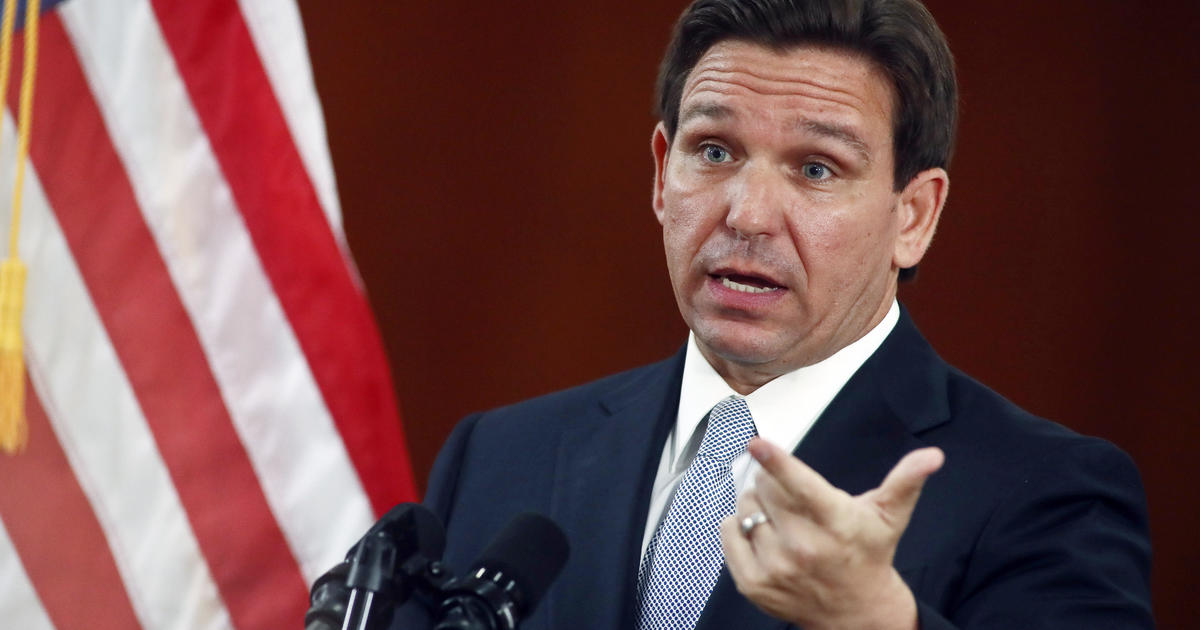
Florida ranked #1 in nation for education, DeSantis takes issue with the reason why
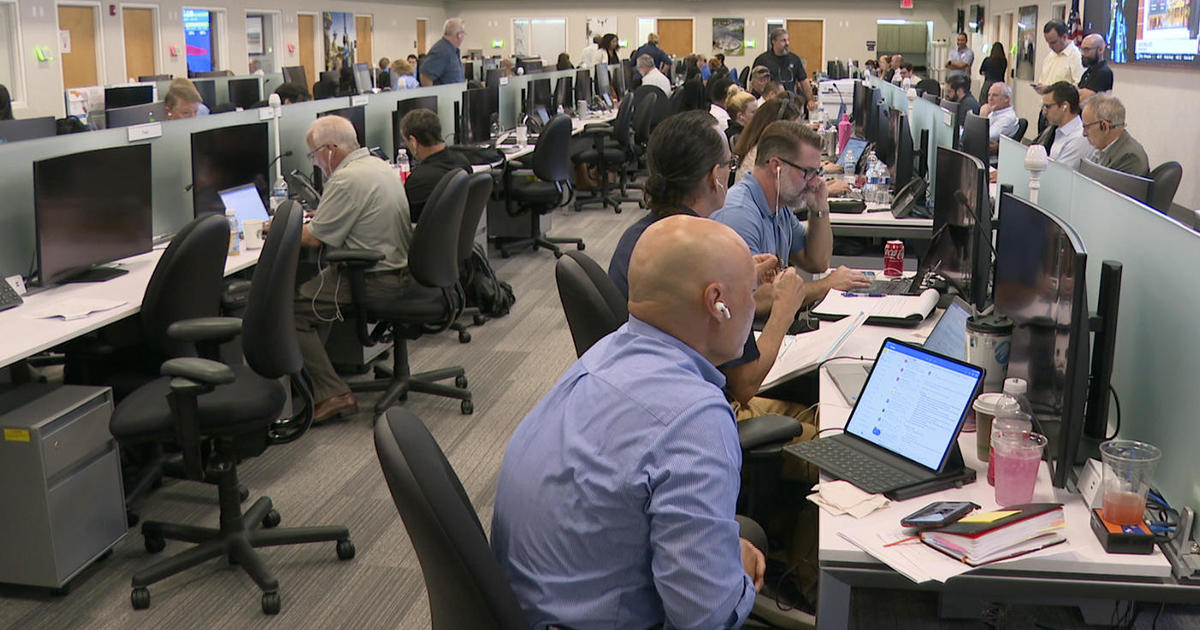
FPL prepares for this year's hurricanes by dealing with a fake one
Florida House passes sweeping new immigration bill. Here's what's in SB 1718:

Florida Governor Ron DeSantis is poised to sign tough penalties and restrictions that aims to obstruct the flow of illegal immigration to the state after the House approved the measure , (CS/SB 1718) , in a mostly party line, 83-36 vote on Tuesday.
The new legislation strengthens employment requirements, bans local governments from contributing money to organizations creating identification cards for undocumented immigrants, bars driver’s licenses issued to non-citizens in other states from use in Florida and repeals a 2014 law that allowed undocumented immigrants to be admitted to practice law in Florida.
Opponents of the bill, like Rep. Dotie Joseph, D-Miami, say the bill brings little clarity.
Leer en español: La Cámara de Florida aprueba un nuevo proyecto de ley de inmigración. Esto es lo que hay adentro:
Concealed carry, immigration, bathrooms: 8 controversial Florida laws go into effect July 1
'What are we going to do?' Two migrants share fears for the future in Florida crackdown
“I’m just trying to figure out why the state is interfering with federal immigration enforcement,” Joseph said.
The legislation (CS/SB 1718) was approved by the House Commerce Committee in a mostly party-line vote on April 24.
What is the new immigration bill?
The new legislation includes nearly every requirement, penalty or limit on undocumented immigrants that DeSantis has pushed for except for an in-state tuition ban for children of immigrants.
Employment requirements
The immigration package allows businesses to conduct random audits of businesses suspected of hiring undocumented workers and increases criminal penalties for human smuggling.
This part of the bill was rewritten because opponents initially feared that it could ensnare friends or family members driving a migrant across town. The bill now only applies to those transporting people from outside the country to Florida.
Immigration bill dialed back: Not a rebellion, but Republican lawmakers dial back DeSantis on immigration, universities
Immigration crackdown: Crackdown on immigration moves ahead – without DeSantis priority
Companies with 25 or more employees will have to use the federal E-Verify system when hiring workers, expanding on a requirement set by the Republican-led Legislature in 2020 that is limited to public employers and contractors, which effectively exempted the state’s powerful agriculture industry.
Penalties for employers who don’t verify their employees’ status could face suspension of their licenses to operate.
IDs and driver’s licenses
Local governments will be banned from contributing money to organizations creating identification cards for undocumented immigrants, and driver’s licenses issued to non-citizens will be barred from use in Florida.
Opponents fear that this provision could cause confusion and lead to law enforcement profiling.
Health care
Hospitals receiving state and federal Medicaid reimbursements will be required to track how much money is spent on undocumented immigrants in emergency rooms.
Illegal immigration in Florida: A by-the-numbers look at a surge
The new law repeals a 2014 law that allowed undocumented immigrants to be admitted to practice law in Florida.
DeSantis pushed for a tuition prohibition but couldn’t find the support to make it into the final legislation. Senate President Kathleen Passidomo, R-Naples, said that several lawmakers served in 2014 when the Florida Legislature under then-Gov. Rick Scott extended in-state tuition to undocumented “Dreamers.”
President Barack Obama signed the Deferred Action for Childhood Arrivals (DACA) program, intended to protect undocumented immigrants brought to the U.S. as children from removal proceedings and gain work authorization.
Immigrants driving labor force growth: How immigrants are driving labor force growth, easing worker shortages and inflation
A sponsor of that bill was DeSantis’ lieutenant governor, Jeanette Nunez, then a House member from Miami.
Democrats and immigrant groups have supported in-state tuition for “Dreamers” along with some Republicans and the business community, stating that access to higher education is better for the overall economy.
Division of Emergency Management’s Unauthorized Alien Transport Program
The legislation also authorizes spending $12 million for the Division of Emergency Management’s Unauthorized Alien Transport Program, a descendant of the spending allowance DeSantis used last year to transport about 50 mostly Venezuelan asylum-seekers from Texas to Martha’s Vineyard, off the Massachusetts coast.
Where are most immigrants in Florida from?
Florida ranks just ahead of New York and well ahead of most other states nationwide, with a total of 57,816 contacts with those who have entered the country illegally between October and February.
The Tallahassee Democrat reported that immigration from four countries has fueled the growing trend, with authorities making contact with 19,442 Venezuelan nationals, 12,840 Cuban nationals, 6,344 Haitian nationals, and 4,201 Ukrainian nationals in Florida between October and February.
However, Cuban nationals account for the bulk of undocumented immigrants who were detained, accounting for 4,398 of the total 5,005 apprehensions this year. Only 349 Haitians were apprehended, and zero Ukrainians and Venezuelans.
- Link copied! Clipboard
SHOWING RESULTS FOR:
Filter results by:
- Past 24 hours
- Past 30 days
- Past 6 months
- Past 3 years
- Amanda Hall
- Andryanna Sheppard
- Annalise Iraola
- Ashley French
- Chris Cifatte
- Claire Galt
- Corey Lazar
- Elizabeth Biro
- Emma Heaton
- WINK News Digital
- Haley Zarcone
- Jacquelyn Kisic
- Jolena Esperto
- Juliana Mejia
- Justin Kase
- Lindsey Sablan
- Maddie Herron
- Matt Devitt
- Michelle Alvarez
- Nash Rhodes
- Nicole Gabe
- Olivia Jean
- Peter Fleischer
- Rachel Cox-Rosen
- Rodaris Richardson
- Russ McCaskey
- Taylor Petras
- Taylor Wirtz
- Tiffany Rizzo
- Zach Maloch
No results for .
Please try another search or check out the latest stories below.

3 family members of teen accused in murder of Kayla Rincon-Miller arrested
New details have emerged surrounding the arrest of a woman whose 16-year-old son is accused of being involved in the murder of Kayla Rincon-Miller, and now her husband and sister are also in jail.

Death investigation in Fort Myers after body is found in truck bed
Fort Myers Police confirm that there is a death investigation at the corner of Market Street and brown street.

Naples ‘celebrity bartender’ stirring up new cocktails at LoLa 41
Michael Slabach often researches ideas, finding a new balance of layers, color, texture and selective glassware to turn his drinks into art.

New affordable housing program in Fort Myers begins
Affordable housing is a rare sighting these days, but one city is making it a priority.

‘Live simply and never give up’ – Motto for Naples couple needing a helping hand
A husband wants nothing more than to share the world with his wife while she is suffering from an illness determined to keep them separated.

Music teacher dilemma at Gulf Coast High School leaves students anxious
Parents are outraged, and students are unsure what the future holds after one of their two beloved music teachers was told they will have to transfer.

Mom celebrates first Mother’s Day with cancer-free daughter
We have one of the best weekends ahead, a time to celebrate mothers everywhere, and as any mother knows, celebrating with your family matters most.

Should commissioners have to live in the District they represent? WINK Investigates why one commissioner doesn’t
The Glades District 1 Commissioner was elected while living in that district. He has since moved. What does that mean for his position?

Boats stuck since Hurricane Ian being removed from Centennial Park area
Boats that have been stuck since Hurricane Ian are in the process of being removed from a messy yard next to Centennial Park and Joe’s Crab Shack.

Man accused of waving knife at Metro PCS workers in Cape Coral
Two women try to help a customer and end up fearing for their lives. One man started waving a seven-inch knife in the faces of two Metro PCS workers.

Overloaded circuit sparks house fire in Jamaica Bay community
A Jamaica Bay community home was damaged in a fire sparked by an overloaded circuit, according to the South Trail Fire & Rescue Service District.

Could Guardian Caps make their way to high school football games?
With the NFL allowing Guardian Caps during regular season games, could we see Guardian Caps during high school football games?

Florida insurer fined $1M over Hurricane Ian claims
The Florida Office of Insurance Regulation issued the seven figure fine to Heritage Property and Casualty Insurance Company for violating a number of Florida laws when handling some of its Hurricane Ian- related claims.

New treatment stops essential tremors and shaking
More than ten million people experience shakes known as essential tremors, which can make everyday tasks like eating and talking challenging.

Ex-wife faces new charges for involvement in near-fatal Naples shooting
The Collier County Sheriff’s Office has arrested the ex-wife of a shooting victim who nearly lost his life.
TRENDING LOCALLY
Nonprofit issues travel advisory warning immigrants away from florida.
Petit’s warning is a result of the proposed Senate Bill 1718 and House Bill 1617. These would fine employers for hiring undocumented workers, fine landlords or people who help house them, reject out-of-state licenses and require hospitals to ask for patients’ immigration status.
Seay does not think SB 1718 is likely to pass, at least not in the current legislative session.
Traveling to Florida is DANGEROUS
Know the risks, know your rights, protect yourself, reconsider travel to florida due to unconstitutional law that targets immigrant communities and abuse civil liberties, caution advised for travelers to florida.
Travel to all areas of Florida should be done with extreme caution as it can be particularly unsafe for people of color, LGBTQIA+ communities and individuals who speak with an accent, and international travelers. Due to unconstitutional legislation signed by Governor Ron DeSantis and supported by Legislative Leadership, every county in Florida poses a heightened risk of harassment, possible detainment, and potential family separation based on racial profiling.
Unconstitutional Legislation Increases Risk in Florida
In Florida, routine daily activities for those who cannot immediately prove United States Citizenship and lawful residency at all times may result in devastating consequences. These consequences include arrest for operating a vehicle, no matter the state you are from, reduced access to healthcare services, and compromised safety. Exercise extra caution if you are over 6 weeks pregnant due to restrictions on reproductive health services.
Risks for Accompanying Individuals in Florida
Family members or friends accompanying a person without a regulated immigration status traveling into the state may be subject to unconstitutional questioning about involvement in transporting or providing any other form of aid. The accompanying individuals, including U.S. citizens and tourists, may be subject to 15 years in prison and up to a $15,000 fine.
Racial Profiling in Florida Affects Many
Naturalized and U.S. Citizens of African, Latin-American, Central American, Native American, Asian, and Pacific Islander descent are not immune from racial profiling, heightened scrutiny, and false arrest.
Consult an Attorney Before Traveling to Florida
It is recommended to consult with a licensed attorney if you fall into any of the above mentioned groups before traveling to Florida in order to assess the level of danger you may encounter in being searched, questioned, and/or arrested.
Caution at Florida Airports and Bus Stations.
Show extreme care in areas around Florida’s 120 Airports as well as at Greyhouse, Megabus and RedCoach bus transportation stations.
Assaults on Medical Freedom
Florida’s Boards of Medicine and Osteopathy have adopted policies banning access to lifesaving medical care for transgender youth and the Agency For Health Care Administration has eliminated Medicaid coverage for transgender adults accessing that care.
Florida is poised to pass laws creating criminal penalties for medical providers who provide medically necessary care for transgender youth, weaponizing the courts to shred existing child custody agreements and reassign transgender youth to an unsupportive parent, and severely restricting access to prescribed medical care for transgender adults.
Florida has passed or is poised to pass bills that restrict access to reproductive health care, including a near-total abortion ban, which threatens to force people to travel out of state or seek unsafe, illegal abortions.
If you decide on travel to Florida, make a clear safety plan
Call the immigrant hotline, your rights cuttable cards.

Advisory Poster
- Share full article
Advertisement
Supported by
N.A.A.C.P. Issues Florida Travel Advisory, Joining Latino and L.G.B.T.Q. Groups
The N.A.A.C.P. urged people to consider Florida’s policies on diversity and race under Gov. Ron DeSantis when thinking of traveling there.

By Jesus Jiménez
The National Association for the Advancement of Colored People on Saturday issued a travel advisory for Florida, saying that under Gov. Ron DeSantis the state has become “openly hostile toward African Americans, people of color and L.G.B.T.Q.+ individuals.”
The N.A.A.C.P. joins the League of United Latin American Citizens , a civil rights organization that issued a Florida travel warning on Wednesday, and Equality Florida , a gay rights advocacy group that issued one last month.
The N.A.A.C.P.’s travel advisory does not explicitly recommend against travel to Florida. But it urges travelers to be aware of the state’s politics, and the organization said that “the governor and the state of Florida have shown that African Americans are not welcome in the state of Florida.”
The N.A.A.C.P. said in a statement on Saturday that the travel advisory was in “direct response to Gov. Ron DeSantis’s aggressive attempts to erase Black history and to restrict diversity, equity and inclusion programs in Florida schools.”
The advisory comes after Mr. DeSantis last week signed legislation defunding diversity programs at the state’s public universities and colleges. The advisory also cited concerns with a number of other laws recently passed in Florida regarding voting rights and concealed carry of guns.
Mr. DeSantis’s office did not respond to a request for comment on Sunday.
After signing the legislation last week on diversity, equity and inclusion programs, Mr. DeSantis said that the law would ensure “Florida’s institutions encourage diversity of thought, civil discourse and the pursuit of truth for generations to come.” Mr. DeSantis has often spoken out about what he describes as “woke indoctrination” and leftist agendas in schools.
It is not clear how much influence the statements will have on travel to Florida. But they demonstrated, along with his escalating disputes with Disney, how Mr. DeSantis’s reliance on conservative culture war issues as he gears up for what is expected to be a presidential run was colliding with the state’s signature industry.
Disney on Thursday announced it was backing off a plan to build an office complex in Orlando that would have cost about $1 billion and brought thousands of jobs to the state.
Derrick Johnson, the president and chief executive of the N.A.A.C.P., said in a statement on Saturday that under Mr. DeSantis’s leadership, Florida had “become hostile to Black Americans and in direct conflict with the democratic ideals that our union was founded upon.”
“Let me be clear,” Mr. Johnson said, “failing to teach an accurate representation of the horrors and inequalities that Black Americans have faced and continue to face is a disservice to students and a dereliction of duty to all.”
Dana Young, president and chief executive of Visit Florida, the state’s tourism marketing corporation, called the travel advisories a “political stunt” most likely to hurt people in Florida who depend on tourism to support themselves and their families.
“It is disappointing when partisan organizations attempt to weaponize travel in pursuit of political ends,” she said.
While the N.A.A.C.P.’s travel advisory follows the new legislation restricting diversity, equity and inclusion programs in Florida schools, the travel advisory from the League of United Latin American Citizens, or L.U.L.A.C., cited concerns about legislation signed by Mr. DeSantis earlier this month that focused on undocumented immigrants.
The legislation will require private employers in Florida with 25 or more workers to confirm an employee’s eligibility to work in the United States. It will also invalidate ID cards issued to undocumented immigrants in other states, such as New York , and it will require Florida hospitals that accept Medicaid to ask patients whether they are U.S. citizens or whether they are “lawfully present” in the country.
David Cruz, a L.U.L.A.C. spokesman, said on Sunday that depending on an individual’s immigration status, the organization’s travel advisory was either a warning not to travel to Florida or an advisory to be cautious while traveling there.
Domingo Garcia, the national president of L.U.L.A.C., said at a news conference on Wednesday that Florida was using “immigrants as political piñatas for the purposes of basically just getting votes.”
In addition to issuing a travel advisory, Mr. Garcia said that L.U.L.A.C. was considering filing a lawsuit in federal court against the state of Florida when the legislation goes into effect in July. Mr. Cruz said the organization was also planning protests “in key Florida cities with significant Latino essential worker populations.”
Equality Florida issued its travel advisory last month, citing concern with a number of laws in Florida, including last year’s passage of legislation that prohibits classroom instruction and discussion about sexual orientation and gender identity in some elementary school grades, a law that is often referred to by opponents as the “Don’t Say Gay” bill.
Nadine Smith , the executive director of Equality Florida, said in a statement last month that her organization had to respond with a travel advisory “as the laws strip away basic rights and freedoms.”
L.U.L.A.C. officials pointed to the economic impact suffered by Arizona after the state passed legislation in 2010 that was viewed as the nation’s toughest effort to crack down on illegal immigration and criticized as encouraging racial profiling. A study at the time found that Arizona lost about $141 million alone in conference business after the state passed its legislation.
Lydia Guzmán, the chair of L.U.L.A.C.’s national immigration committee and state director for the organization in Arizona, said the state took a serious economic hit as a result of adverse reaction to the legislation.
“I see that happening also in Florida,” Ms. Guzmán said.
Jesus Jiménez is a general assignment reporter. More about Jesus Jiménez
- Skip to main content
- Keyboard shortcuts for audio player
To keep immigrants from fleeing, Florida GOP focus on immigration law loopholes

Vanessa Romo

Florida lawmakers say SB 1718, a new anti-immigration law set to take effect on July 1, was written to scare migrants from moving to the state. Now, they're trying to convince people to stay. Lynne Sladky/AP hide caption
Florida lawmakers say SB 1718, a new anti-immigration law set to take effect on July 1, was written to scare migrants from moving to the state. Now, they're trying to convince people to stay.
Florida Republicans who voted to pass the state's imminent anti-immigration law are trying to curb a potentially disastrous mass exodus of undocumented residents by touting the legislation's many "loopholes."
GOP Rep. Rick Roth, a third generation farmer, told NPR on Tuesday that state Senate Bill 1718, which goes into effect on July 1, was designed to "scare migrants." But he admitted that he and his colleagues were unprepared for the destabilization it would cause among the state's more established immigrant communities.
Roth and a handful of other Republicans, including state representatives Alina Garcia and Juan Fernandez-Barquin, are scrambling to allay fears of job losses or deportation, which they say are already driving workers out of the state.
"It's very dangerous for agriculture. We desperately need more legal workers and this is going to make it worse," he warned.
Among the legislation's many provisions is a new mandate for all businesses with 25 or more employees to run new hires through E-Verify, a database that tracks whether individuals are legally able to work in the U.S.
It also limits social services for undocumented immigrants, allocates millions more tax dollars to expand DeSantis' migrant relocation program , and requires hospitals that get Medicaid dollars to ask for a patient's immigration status. Another provision makes it a human smuggling felony to transport an immigrant who has not been "inspected" by authorities into Florida. The latter is striking deep fear among mixed-status families who may travel across state lines together.
But by delving into the bill's details in public forums, Roth said, he hopes to persuade long-time immigrant residents who already have jobs not to flee the state because the law "is not as bad as you heard."
He added: "The bill really has a lot of loopholes in it that gives you comfort. And the main purpose of the bill is to deter people from coming and to tighten the enforcement in the future."
Had the bill been intended to be fully enforced, it would have included funding for enforcement, according to Roth. "So that's why I'm trying to tell people that it's more of a political bill than policy."

Why Florida's new immigration law is troubling businesses and workers alike
During a faith-based event addressing the implications of the new law on Monday, Roth was captured on video urging attendees not to leave the state despite the bill's intimidating language.
"This bill is 100 percent supposed to scare you," Roth said. "I'm a farmer and the farmers are mad as hell. We are losing employees that are already starting to move to Georgia and other states. It's urgent that you talk to all your other people and convince them that you have resources, state representatives, other people that can explain the bill to you."
State Rep. Alina Garcia starts by saying she came unprepared, admits the bill is meant to “scare people from coming to Florida” and irresponsibly lies and says the anti-immigrant law has “no teeth.” She should have prepared by actually reading the bill she voted for. https://t.co/LzsV2qgG0F pic.twitter.com/yHTxNArAR4 — Thomas Kennedy (@tomaskenn) June 5, 2023
At the same event, Rep. Garcia, a Cuban immigrant who arrived in the U.S. as a 2-year-old, said the new law has already " done its purpose " of preventing new arrivals across the state.
"This bill really doesn't have any teeth," she added.
Neither representative addressed questions about what undocumented workers might do if they were to get laid off from an existing job after the law goes into effect.
When asked about provisions in the bill that would make it a felony for mixed-status families to travel into Florida together, Roth suggested it would be unlikely that anyone would be charged.
"I think people are are extrapolating the situation into the worst case scenario," he said.
Garcia and Fernandez-Barquin did not immediately respond to NPR's requests for comment.

An official website of the United States government
Here’s how you know

Official websites use .gov A .gov website belongs to an official government organization in the United States.
Secure .gov websites use HTTPS A lock ( Lock A locked padlock ) or https:// means you’ve safely connected to the .gov website. Share sensitive information only on official, secure websites.

- Trusted Traveler Programs
- Global Entry
- Enrollment Centers
Immigration checkpoints: Are there any in Florida?
Curious about immigration checkpoints and security in Florida?
With the ink on Gov. Ron DeSantis' signature still wet from approving Florida's Senate Bill 1718, the Immigration Bill today, many citizens and noncitizens alike are asking Google if there are immigration checkpoints in the Sunshine state.
Read more: DeSantis signs illegal immigration crackdown and rails against Biden
Does Florida have immigration checkpoints?
"Currently, the U.S. Border Patrol has six Border Patrol Stations throughout Florida along with an intelligence division," said U.S. Border Patrol spokeman Adam C. Hoffner via email. "We do not have any checkpoints in Florida."
According to a 2022 report from the U.S. General Accounting Office , there are more than 110 U.S. Border Patrol checkpoints, located generally 25 to 100 miles from the southwest and northern borders along highways and secondary roads. You'll find them scattered across the four states that border Mexico and in some of the 14 states that border Canada.
There are, however, six Border Patrol Stations located within the Florida area of responsibility of the Miami Border Patrol Sector. According the U.S. Border Patrol, these stations are strategically located and staffed to address the current threat within the State of Florida only. Those stations are responsible for monitoring Florida's points of entry - cruise and shipping ports, airports, etc.
Where are the Florida Border Patrol Stations?
There are six U.S. Border Patrol stations in Florida:
Tampa Station, 3811 Corporex Park Drive, Tampa, FL 33619
Marathon Station , 3770 Oversees Highway, Fat Deer Key, Marathon, FL 33050
West Palm Beach Station , 3301 Lake Shore Drive, Riviera Beach, FL 33404
Jacksonville Station, 489 Dundas Drive, Jacksonville, FL 32218
Dania Beach Station, 1800 NE 7th Ave., Dania Beach, FL 33004
Orlando Station, 2348 Trade Port Drive, Orlando, FL 32824
Is Florida considered an international border state?
Yes. The United States shares land borders with Mexico and Canada. It also shares maritime borders with Russia, Cuba and the Bahamas. Cuba is roughly 100 miles south of Key West. Bimini Island in the Bahamas is roughly 50 miles from Miami depending on where you get your data.
Where is the Miami sector headquarters?
The Miami sector headquarters is at 15720 Pines Boulevard, Pembroke Pines, FL, 33027. The phone number is (954) 965-6300
Rob Landers is a veteran multimedia journalist for the USA Today Network of Florida. Contact Landers at 321-242-3627 or [email protected] . Instagram: @ByRobLanders Youtube : @florida_today
Support local journalism. Subscribe today.
Official websites use .gov A .gov website belongs to an official government organization in the United States.
Secure .gov websites use HTTPS A lock ( A locked padlock ) or https:// means you've safely connected to the .gov website. Share sensitive information only on official, secure websites.
- Create Account
USCIS Celebrates Its Employees During Public Service Recognition Week
USCIS is honoring its dedicated workforce during Public Service Recognition Week, May 5-11. Celebrated since 1985, it honors those who serve our nation as federal, state, county, and local government employees. For more information, see our news release.
FY 2024 Citizenship and Integration Grant Program Application Period is Open!
The application period for the Citizenship and Integration Grant Program will run from April 24 through June 21. The program will provide up to $10 million in grants.
Authorizing Deferred Enforced Departure for Palestinians
On Feb. 14, 2024, President Biden issued a Memorandum to the Secretary of Homeland Security authorizing Deferred Enforced Departure (DED) and employment authorization for 18 months for eligible Palestinians.
Completing an Unprecedented 10 Million Immigration Cases in Fiscal Year 2023, USCIS Reduced Its Backlog for the First Time in Over a Decade
U.S. Citizenship and Immigration Services (USCIS) is releasing end of fiscal year (FY) 2023 data that illustrates the agency’s progress in meeting its strategic priorities.
USCIS REVISES POLICY MANUAL TO ALIGN WITH NEW FEE RULE
We have updated our guidance in the USCIS Policy Manual to align with the fee final rule, which is effective on April 1, 2024.
Information for Individuals Impacted by the Israel-Hamas Conflict
U.S. Citizenship and Immigration Services reminds the public that the United States offers immigration and related services that may help people affected by emergencies and unforeseen circumstances, including the Israel-Hamas conflict.
Processes for Cubans, Haitians, Nicaraguans and Venezuelans
DHS has implemented processes through which nationals of Cuba, Haiti, Nicaragua, and Venezuela, and their qualifying immediate family members, may request to come to the United States in a safe and orderly way.

Afghan Related Information
Afghan parolees who received the Afghan Parole Information sheet from Customs and Border Protection and did not to go to the government-run locations where vaccination services are provided must attest to their vaccination status.
Uniting for Ukraine
Uniting for Ukraine provides a pathway for displaced Ukrainian citizens and their immediate family members who are outside the United States to come to the United States and stay temporarily for a two-year period of parole.
Immigration Relief for those Impacted by Unforeseen Circumstances
Have you been affected by unforeseen circumstances, such as natural catastrophes, severe illness, or a conflict abroad? USCIS has resources to help.
Know Before You Go
Check for current office closure, COVID information and office location prior to visiting one of our offices.
- Office Closings
- Find A USCIS Office

File Online

Filing a form online is easier and faster than paper filing. It gives you a simple and personalized way to track your case online. You can also access other USCIS services.
The first step is to create an account .
Manage Your Case

Use our online tools and resources to manage your case:
- Check your case status
- Check processing times
- Change your address online
News & Alerts
Upcoming engagements.

- Immigration and Citizenship Data
- Electronic Reading Room
- USCIS Freedom of Information Act (FOIA)
- Laws and Policy
- Historical Library

- I-9 Central
Social Media
U.S. Citizenship and Immigration Services

Opinion | No special session is good news for Florida |…
Share this:.
- Click to share on Facebook (Opens in new window)
- Click to share on X (Opens in new window)
Daily e-Edition
Evening e-Edition
- Letters to the Editor
Opinion | No special session is good news for Florida | Editorial

Better yet, he should flatly promise that he won’t. Having “no plans” leaves wiggle room to change his mind.
There is a way, however, for the Legislature’s leaders to close that door.
They could do it, and should, by promptly sending him the next fiscal year’s budget to sign or veto. It has been in their hands for two months now.
The budget as a weapon
So long as the $117.5 billion spending bill is vulnerable to his vetoes, it’s useful as a political negotiating tool to force legislators to do whatever he might want of them.
The budget is packed with local projects that matter greatly to their sponsors.
Once the budget is signed, all that leverage is gone.
DeSantis broached a special session possibility in March on a podcast with Sean Hannity, saying he wanted to empower Florida law enforcement officers to arrest undocumented immigrants, as Texas would be doing under a new law that federal courts have blocked temporarily.
While saying he has “no plans” now, DeSantis also said “of course I’ll do more immigration,” which he’s confident legislators would approve.
“But as of now, we’re moving forward with the budget,” he said.
After two months, nothing
As of now, nothing is happening on the budget. Although the House and Senate approved it on March 8, House Speaker Paul Renner and Senate President Kathleen Passidomo still haven’t gotten around to sending it to the governor.
That’s the last step, an essential one under the Constitution, before a 15-day clock runs on the governor’s decision to sign it, veto it or veto specific line items while approving others.
It’s a public document, so DeSantis and his staff know what’s in it. It can be presumed that he’s already decided what he likes and what he doesn’t.
There’s no good reason for him not to act on it and a very good reason why he should.
The sooner the better
The state agencies, school boards, counties, cities and assorted nonprofits that depend all or in part on state money need to plan for what they’ll have and how to spend it before the next state fiscal year begins July 1. The sooner they know, the better. (For cities, counties and school districts, the fiscal year begins Oct. 1.)
But so long as he doesn’t act on it, all 160 legislators have an incentive to be nice to the governor, who vetoed $510.8 million of their projects last year. He didn’t state a reason for any of those vetoes, even though the Constitution’s plain text requires that he explain them. It was doubtful they were legal, but the Legislature didn’t challenge them.
The Legislature’s minority Democrats are fearful of a special session, and rightly so. They worry that it would be used to muddy the November ballot with deceptive alternatives to Amendment 3, the initiative legalizing non-medical marijuana use, or Amendment 4, the abortion rights initiative.
Dirty tricks are always an inherent danger in any short special session.
Florida isn’t overwhelmed with undocumented immigrants. The ones here now are essential to three pillars of the state’s economy: agriculture, construction and hospitality. The anti-immigrant laws he’s already passed have impacted employers, particularly in agriculture.
In his ambition to get elected president someday by being tougher than Texas Gov. Greg Abbott or former President Donald Trump, DeSantis has signed laws increasing jail terms for driving without a license, denying licenses to undocumented immigrants, and preventing cities and counties from honoring ID cards issued to them elsewhere.
Any new law prompting mass police arrests would not only hurt Florida’s industries even more but would also lead to innocent people being thrown in jail.
Excessive police power
The Legislature has already given DeSantis too much police power, especially considering how he has been sending state law enforcement officers to the Texas border and plans to use the Florida State Guard — for which no real need exists — to intercept migrants at sea.
The Miami Herald has found that one of the State Guard’s recent recruits is a former Miami police captain “whose long history of citizen complaints, alleging beatings, false arrests and harassment made him notorious in the city he swore to protect and serve.”
He is Javier Ortiz, 44. The city had fired him but rescinded the order on the condition he give up his issued weapon, take a nighttime desk job and commit to an early retirement.
That followed investigations by the FBI and the Florida Department of Law Enforcement into nearly 70 complaints, including 18 allegations of excessive use of force. The city settled some of them for nearly $600,000, the Herald said. His record is redolent with racism.
His recruitment reflects badly on DeSantis’ management of the powers he already has, and is another reason why a special session is a sleeping dog that should be left alone.
The Sun Sentinel Editorial Board consists of Opinion Editor Steve Bousquet, Deputy Opinion Editor Dan Sweeney, editorial writer Martin Dyckman and Editor-in-Chief Julie Anderson. Editorials are the opinion of the Board and written by one of its members or a designee. To contact us, email us at [email protected] .
More in Opinion

Opinion Columnists | Palm Beach Democrats had better fix things now | Pat Beall

Opinion | An unseemly backroom deal may revive a political career | Editorial

Commentary | Abortion and the rule of law on the Florida Supreme Court | Opinion

Letters to the Editor | Condo board service can be thankless work | Letters to the editor

Florida and the federal government tangle over an immigration case

Florida and the federal government squared off this week in an appeals court about whether the state could legally challenge Biden administration policies that led to undocumented immigrants being released from detention.
Lawyers for the two sides filed briefs late Monday at the 11th U.S. Circuit Court of Appeals. Gov. Ron DeSantis and Florida Attorney General Ashley Moody have made a high-profile issue of criticizing the Biden administration’s handling of immigration issues, but the U.S. Supreme Court ruled last year that Texas and Louisiana did not have legal standing to challenge certain immigration policies.
In light of the Supreme Court ruling, the Atlanta-based appeals court ordered Florida and the federal government to file briefs about whether the state had standing to challenge what are known as “parole” policies.
Lawyers in Moody’s office wrote that the Supreme Court case does not bar Florida’s challenge, largely because the Texas and Louisiana case focused on issues related to arresting migrants — while the Florida challenge involves paroling people who have already been detained.
“Texas (the Texas and Louisiana case) involved the executive branch’s historic discretion to enforce federal law,” the state’s 35-page brief said. “But here, the challenged policies are much more than a mere failure to enforce the law. They instead confer temporary legal status and other statutory benefits in the form of parole.”
But in their 34-page brief, U.S. Department of Justice lawyers called such a distinction “immaterial” and said both cases “concern policies vested with discretion.”
“Here, DHS’s (the U.S. Department of Homeland Security’s) parole policies reflected decisions about how to best use its limited resources to process and detain noncitizens who unlawfully entered the United States during particular periods of time,” the Justice Department brief said.
Florida filed a lawsuit in September 2021 challenging Biden administration policies. The lawsuit ultimately led to two rulings last year by U.S. District Judge T. Kent Wetherell that said policies, known as “Parole Plus Alternatives to Detention” and “Parole with Conditions,” violated federal law.
“Here, DHS’s (the U.S. Department of Homeland Security’s) parole policies reflected decisions about how to best use its limited resources to process and detain noncitizens who unlawfully entered the United States during particular periods of time.”
The Pensacola-based judge issued the rulings before the Supreme Court decided the Texas and Louisiana case. Justice Department attorneys, who have long argued that Florida did not have legal standing, took the dispute to the Atlanta-based appeals court.
After the Supreme Court decision, the appeals court in February directed Wetherell to consider again whether he had “jurisdiction” in the Florida challenge. Plaintiffs must show standing before judges have jurisdiction to decide cases. So if Florida didn’t have standing, Wetherell couldn’t have ruled in its favor.
Wetherell, a former state appellate judge who was appointed to the federal bench by former President Donald Trump, quickly issued a decision supporting his earlier rulings that Florida had standing. Like the state’s arguments this week, he drew distinctions between the issues in the Florida and Texas lawsuits.
“The policies at issue in these (Florida) cases do not involve arrest or prosecution, but rather explain how DHS (the U.S. Department of Homeland Security) will exercise its statutory ‘parole’ authority … with respect to aliens who are already in DHS custody after arriving at the southwest border,” Wetherell wrote. “Nothing in Texas (the Supreme Court opinion) held that federal courts cannot adjudicate the validity of non-detention/parole policies like these.”
After Wetherell’s decision, the appeals court last month ordered additional briefs.
Florida also contends that it has standing because of costs associated with migrants coming to the state. As an example, it said the state faces costs for educating additional children.
“The district court (Wetherell) correctly concluded that DHS’s policies authorizing the mass parole of aliens into Florida impose financial costs on Florida as well as injure Florida’s quasi-sovereign interest in its territory and the presence and movement of unauthorized aliens within its borders,” the state’s brief said.
But Justice Department lawyers wrote that Florida “alleges an indirect injury and failed to provide sufficient evidence of harm.”
“Following (the Supreme Court decision in the Texas and Louisiana case), it is no longer sufficient for a state to argue that a change in federal policy may increase population and indirectly change state expenditures with respect to driver’s licenses, education, health care, or law enforcement,” the Justice Department brief said. “Finding standing whenever a change in federal policy would cause some incidental costs to states would allow any state to challenge any change in immigration policy, and improperly draw courts into generalized grievances on behalf of states that were unable to obtain their preferred policy outcomes through the political process.”

- Today's news
- Reviews and deals
- Climate change
- 2024 election
- Fall allergies
- Health news
- Mental health
- Sexual health
- Family health
- So mini ways
- Unapologetically
- Buying guides
Entertainment
- How to Watch
- My watchlist
- Stock market
- Biden economy
- Personal finance
- Stocks: most active
- Stocks: gainers
- Stocks: losers
- Trending tickers
- World indices
- US Treasury bonds
- Top mutual funds
- Highest open interest
- Highest implied volatility
- Currency converter
- Basic materials
- Communication services
- Consumer cyclical
- Consumer defensive
- Financial services
- Industrials
- Real estate
- Mutual funds
- Credit cards
- Balance transfer cards
- Cash back cards
- Rewards cards
- Travel cards
- Online checking
- High-yield savings
- Money market
- Home equity loan
- Personal loans
- Student loans
- Options pit
- Fantasy football
- Pro Pick 'Em
- College Pick 'Em
- Fantasy baseball
- Fantasy hockey
- Fantasy basketball
- Download the app
- Daily fantasy
- Scores and schedules
- GameChannel
- World Baseball Classic
- Premier League
- CONCACAF League
- Champions League
- Motorsports
- Horse racing
- Newsletters
New on Yahoo
- Privacy Dashboard
Could a special session bring lawmakers back to Florida Capitol for abortion, immigration?
- Oops! Something went wrong. Please try again later. More content below
Gov. Ron DeSantis and some Republican lawmakers are talking about holding a special legislative session this month – possibly to enact another strict immigration law and add ballot proposals to November that might complicate the abortion access measure.
There’s little hard evidence that lawmakers are planning a late-May special session, an idea first reported Wednesday by the news site, Florida Politics.
But DeSantis Thursday poured cold water on the idea of creating further amendments related to abortion, during an appearance in Jacksonville, though he did express a desire for summoning lawmakers back to Tallahassee to further strengthen his hand on illegal immigration enforcement.
"The states need to do whatever we can," DeSantis said.
But on the idea of adding additional amendments to the November ballot, the governor said it was, "Not coming from me." Still, he didn't rule out the possibility that some legislative Republicans might push the approach.
But talk of the possibilities were swirling on the same day that Vice President Kamala Harris was in Jacksonville campaigning in support of abortion rights.
DeSantis a day earlier had talked about the state’s new six-week abortion law at length for the first time and also ridiculed both the Amendment 4 abortion access measure and the Amendment 3 recreational marijuana ballot proposal set for the November ballot.
DeSantis promised he'll 'be getting involved in different ways'
“We’ll be getting involved in different ways,” DeSantis said during an appearance in Tampa, without offering specifics.
The governor several weeks ago had gone on Fox News host Sean Hannity’s podcast and talked about how his administration was working on a proposal to make it a crime for migrants to enter Florida without authorization, modeled on a Texas law.
“I’m working with folks to craft, if there’s something we can do in a Special Legislative Session, to give our law enforcement more authority to arrest and detain, because I think that will be a huge disincentive for people to come if we can do it,” DeSantis said on the show.
During his appearance
The proposal would allow state courts to direct sheriffs and city police to transport migrants back to the Mexican border for deportation if they are found to be in the state illegally.
DeSantis raised the possibility when he was also warning against a surge of Haitians fleeing their home nation to Florida because of violence.
That surge hasn’t happened, but DeSantis may still be eager to take another swipe at immigration, having enacted strict new limits in 2023, shortly before launching his failed presidential campaign.
The governor recently also patched things up with former President Trump, who viciously attacked him when they were rivals for the GOP presidential nomination. The pair met last weekend for breakfast in Miami, and DeSantis purportedly pledged to help with fundraising and the campaign in Florida.
Immigration a driving issue for Republican voters
Concerns over illegal immigration and border security was central to Trump’s 2016 campaign, when he won the presidency and polls show it remains the Republican Party’s most potent political weapon this year.
The governor’s office didn’t immediately respond to a question about a possible special session. A spokeswoman for Senate President Kathleen Passidomo, R-Naples, said that she has not been contacted on the topic.
Andres Malave, a spokesman for House Speaker Paul Renner, R-Palm Coast, said, “there’s lots of talking.”
But he acknowledged in a text message, “People have been talking about there being a special since the hanky dropped” in March, ending the 2024 regular session. “No plans yet, to my knowledge,” he added.
But Rep. Anna Eskamani, D-Orlando, seized on talk of additional ballot measures which could cloud the Amendment 4 abortion access measure set for the November ballot.
“The Florida Republican Party is so committed to banning abortion and stripping us away of our rights that they are willing to host a special session to add more amendments that will only confuse voters,” Eskamani said.
The tactic wouldn’t be new in Florida. In 2016, the utility industry, wary of a “solar choice” constitutional amendment going on the ballot, mounted a costly campaign that successfully put an industry-friendly solar amendment before voters.
While the more consumer-oriented solar choice proposal was blocked from the ballot by the state Supreme Court, the industry’s amendment also fell short of gaining at least 60% support from voters, and also failed.
David Bauerlein of the Florida Times-Union contributed to this report. John Kennedy is a reporter in the USA TODAY Network’s Florida Capital Bureau. He can be reached at [email protected] , or on X at @JKennedyReport .
This article originally appeared on Tallahassee Democrat: Florida special session for abortion, immigration measures? Talk swirls
Recommended Stories
Florida’s 6-week abortion ban takes effect, dozens arrested in campus protests overnight and king charles resumes public duties.
Get caught up on this morning’s news: Florida’s six-week abortion ban, campus arrests and more in today’s edition of The Yodel newsletter
Florida's 6-week abortion ban is now in effect. Here's how the law affects access to the procedure in the Southeast.
Florida's six-week abortion ban takes effect on May 1. Here's what the law says and how it will affect access to the procedure beyond state lines.
Stock market today: Dow nabs 8th straight winning session, S&P 500 marches back toward record high
Investors are listening out for a parade of Fed speakers to test a growing confidence that a rate cut is on the way.
Scammers found planting online betting ads on Indian government websites
TechCrunch discovered around four dozen "gov.in" website links associated with Indian states, including Bihar, Goa, Karnataka, Kerala, Mizoram and Telangana that were redirecting to online betting platforms. The scammy links were indexed by search engines, including Google, making the ads easy to find online. The redirecting websites, touted as "Asia's most popular" online betting platform and "the number one online cricket betting app in India," claim to allow betting on games, including cricket tournaments such as the Indian Premier League.
Doctor Who Space Babies review: Bet you didn’t expect that
'Space Babies' is crazy, chaotic and political. Just as Doctor Who should be.
Doctor Who: The Devil’s Chord review: Is this madness?
'The Devil's Chord' is a mess, but it's probably an intentional mess.
The 27 best Walmart deals to shop this weekend — save more than 80% on gardening supplies, tech items and more
Some major deals on board: A lovely vertical garden for just $40, a remarkable mini movie projector for a staggering $620 off and a handy Bissell upright vacuum for under $60.
Motional cut about 550 employees, around 40%, in recent restructuring, sources say
Around 550 employees across autonomous vehicle company Motional have been laid off, according to information taken from WARN notice filings and sources at the company. Earlier this week, TechCrunch reported that Motional is pausing commercial operations and delaying plans to launch a robotaxi service with its next-gen Hyundai Ioniq 5 robotaxis until 2026 as it undergoes restructuring. An employee at Motional who spoke to TechCrunch on the condition of anonymity said every team has been affected, with high-level departures including the company’s chief operating officer, Abe Ghabra.
'Like magic': This viral anti-aging wand tackles wrinkles and evens skin tone — and it's nearly 50% off
Score this 4-in-1 smoothing, brightening, rejuvenating tool that reviewers say 'really delivers.'
OpenAI's ChatGPT announcement: What we know so far
OpenAI has a livestreamed announcement planned for 10 a.m. PT on Monday — but it's trying to keep expectations under control. Altman’s wording was presumably alluding to a Reuters report published earlier this week, suggesting that OpenAI plans to announce an AI-powered search product on Monday — stealing some thunder from the Google I/O developer conference, which starts Tuesday. The report also said the announcement date “is subject to change.”
Pssst: You can save 35% on a Le Creuset Dutch oven in the brand new Peche color — just in time for summer
The soft coral-esque shade will add the happiest pop of color to your kitchen — especially at $150 off.
Bird flu: The latest on U.S. spread, the safety of milk and new federal funding to prevent outbreaks
Everything you need to know about the spread of avian influenza, aka bird flu, in the U.S. and new federal funding.
Anthropic's Claude sees tepid reception on iOS compared with ChatGPT's debut
Consumer demand for mobile AI chatbot apps outside of ChatGPT may be waning. Earlier this month, Anthropic launched its first mobile app on iOS, providing access to its Claude 3 model for both free and paid users. Unlike ChatGPT, Claude did not become a new App Store hit.
Pitch Deck Teardown: Cloudsmith's $15M Series A deck
Back in September 2021, Cloudsmith raised $15 million in Series A funding for its cloud platform that manages companies’ software supply chains. The presentation has 36 slides — 25 make up the main deck, eight are in the appendix and three are addenda.
Novak Djokovic hit in head by water bottle, needed medical attention after opening win at Italian Open
Italian Open organizers said a water bottle accidentally fell out of a fan’s backpack while they were trying to reach down to get his autograph on Friday in Rome.
Northern lights could be visible across the U.S. this weekend because of a severe geomagnetic storm. Here's how you could see it.
The lights, also known as aurora borealis, might be visible as far south as Alabama, according to NOAA.
More than 11,500 fans swear by this $449 iPad Air — that's a match to its lowest-ever price
"The graphics are beautiful, there's no lag and no memory storage issues," said one fan.
RIP Chevy Malibu; BMW passes on pickups; EV business breakdowns | Autoblog Podcast #831
Greg has a special guest this week - Pras Subaranian from Yahoo Finance. They take a look at the business side of recent auto news, and yes, talk cars.
Malik Nabers, Jayden Daniels call off $10,000 bet on Offensive Rookie of the Year award after gambling education
Well that didn't last long.
Save your floors! These genius 'As Seen On TV' furniture leg protectors are down to about $1 a pop
'The chairs glide smoothly now': This affordable home hack has over 17,000 five-star fans.
DeSantis says he has no plans to call a special session of the Florida Legislature
Amid widespread speculation about lawmakers possibly returning to Tallahassee , Gov. Ron DeSantis said Tuesday he has “no plans” to call a special session but would back stricter immigration measures from the Republican-controlled Legislature.
“I have no plans to call a special session. You know, I've been asked, ‘Would you do more immigration?’ Of course I'll do more immigration. Would you do this? Of course I will,” DeSantis said during an appearance in Cape Canaveral.
The governor has signaled that he would support an immigration law similar to a Texas measure that allows local law-enforcement officers to arrest people suspected of being in the country illegally and judges to essentially order migrants’ deportation.
DeSantis indicated Tuesday he was unsure “whether that’s a special session or not, but I am for some of the things that people have been talking about.” DeSantis or legislative leaders could call a special session.
“But we don't have a plan necessarily to do a special session. You know, if there are things that we need to do that I'm sure that the Legislature will want to do it. But as of now we're, we're moving forward with the budget,” the governor said.
Prep for the polls: See who is running for president and compare where they stand on key issues in our Voter Guide
Along with the immigration issue, speculation has included that a special session could address proposed constitutional amendments that will be on the November ballot.
State Republican leaders oppose a proposed amendment that would enshrine abortion rights in the Constitution and a proposal that would allow recreational marijuana use in Florida.
On the marijuana amendment, for instance, lawmakers could craft legislation imposing what are known as time, place and manner restrictions for cannabis use.
An expert's guide to Orlando, Florida – beyond the theme parks

May 5, 2024 • 7 min read

From glistening beaches to space exploration past and present, Orlando has tons for you to see © Shutterstock
There's a reason 75 million people visit Orlando annually, and it isn't just the mouse. Don't get us wrong. Disney World is incredible and deserves a place on any theme park lover’s bucket list, but Orlando is so much more than its theme parks. It’s an ever-evolving city with vibrant parks, public art and award-winning restaurants. And that’s before you get to amazing day trips to the Kennedy Space Center or New Smyrna Beach .
I have family near Orlando and I’ve visited dozens of times through the years, usually for a week at a time. I’ve come to love this special place. Whether it’s your first trip to Orlando or you’re looking for something to do outside the theme parks, our expert guide to Orlando will help you make the most of your trip.
When should I go to Orlando?
There’s no wrong time to visit Orlando , but here are a few facts to inform your decision. First, no matter the time of year, holidays are crowded and expensive (this includes the days framing the actual holiday). There’s also the rainy season from May to October. Luckily, in a place as lovely as Florida, the rainfall is intense but mercifully brief.
Hurricane season is from June through November. In recent years, weather systems like Hurricane Ian have caused theme parks like Disney World and Universal Studios to close for multiple days. If you’re visiting Orlando during hurricane season, it’s best to book flexible airfare, lodging, rental car reservations, etc.
The high tourist season in Orlando is from March to April and June to August. Kids are typically out of school for spring and summer breaks, so the big attractions like theme parks are often crowded. Humidity is high, and temperatures are often in the 90s.
The shoulder season in Orlando is in May and September through November. In May, temperatures reach the mid to high 80s, and after the sweltering summer, they drop to the upper 70s in November. During the shoulder season, you’ll usually find better deals on lodging.
December is usually the low season (excluding Christmas through early January when the kids are on holiday break). The temperatures are cooler but exceedingly pleasant, with averages in the middle 70s. This is the time of year when you’ll usually get the best pricing as long you avoid school breaks and holidays.
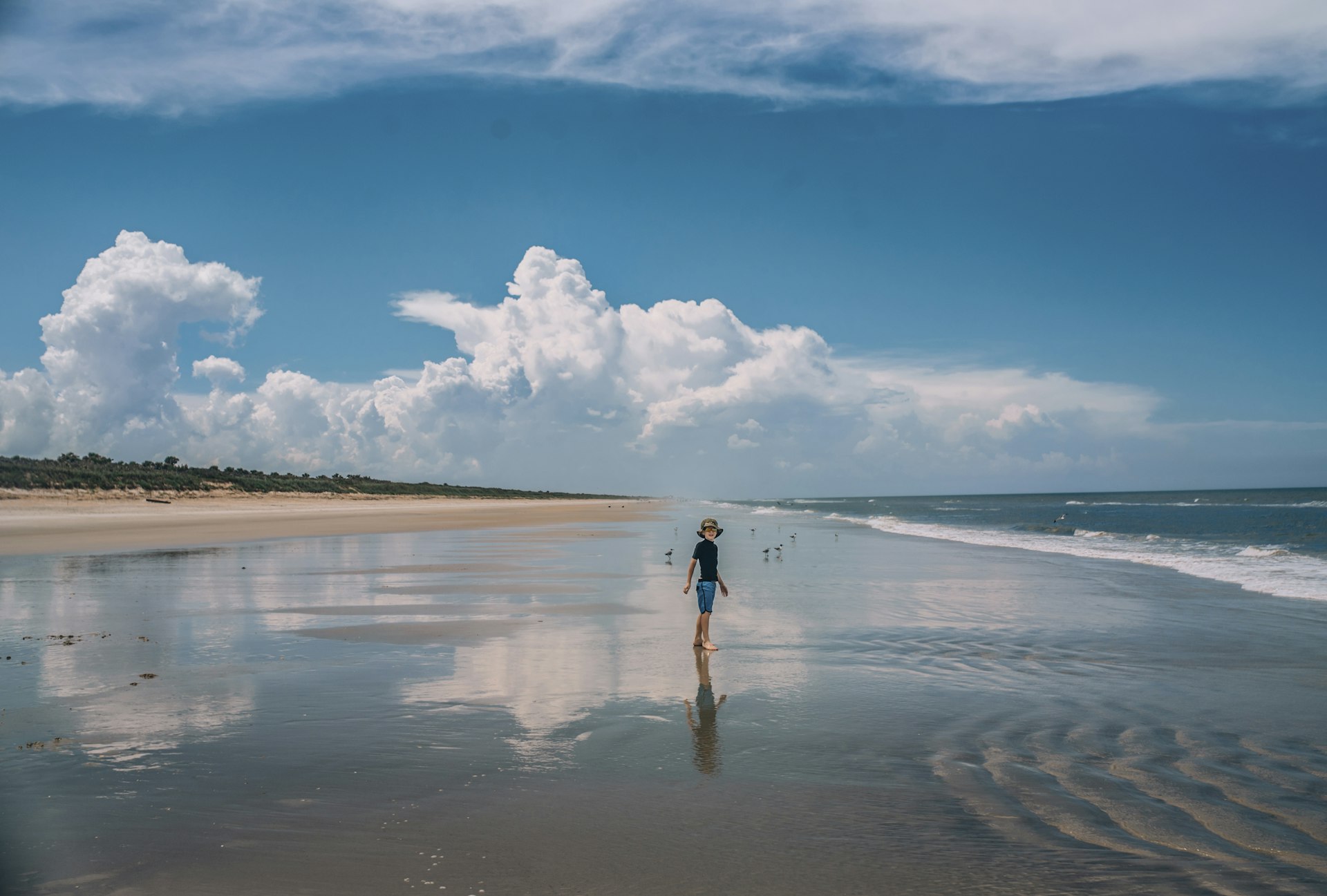
How many days do you need to see Orlando?
Although you can easily spend longer and not regret it, the average visitor to Orlando spends 5-7 nights. A stay of this length ensures you’ll have time to visit the theme parks (if that’s on your itinerary), plus explore downtown Orlando and some Florida beaches.
Is it easy to get around in Orlando?
Most long-distance travelers fly into Orlando International Airport. If you’re staying at a Disney area hotel and don’t plan on spending much time outside the resort, you might find it cheaper to take the Mears Connect shuttle over an Uber or rental car, although this largely depends on your group size. The shuttle operates 24/7.
If you’re a Florida local, the recently debuted Brightline offers fast train service connecting Orlando to cities like Palm Beach , Fort Lauderdale and Miami . Alternatively, the Sun Rail offers train service with stops in Poinciana (about half an hour from Disney World), downtown Orlando, Kissimmee and DeBary.
Downtown Orlando has an excellent public transportation system. LYMMO provides free Bus Rapid Transit service seven days a week to major downtown destinations like Lake Eola Park or the Bob Carr Theater . The Lymmo does not provide service to the airport or theme parks. Or, enjoy the beautiful Florida weather and utilize Orlando’s bike and scooter share program .
What are the top things to do in Orlando?
I don’t know if you’ve heard, but Orlando has theme parks. Walt Disney World , Universal Studios , Legoland , etc, are all in the area. If these attractions are the reason for your visit, that’s wonderful. However, there are a lot of things to do in Orlando outside the theme parks.
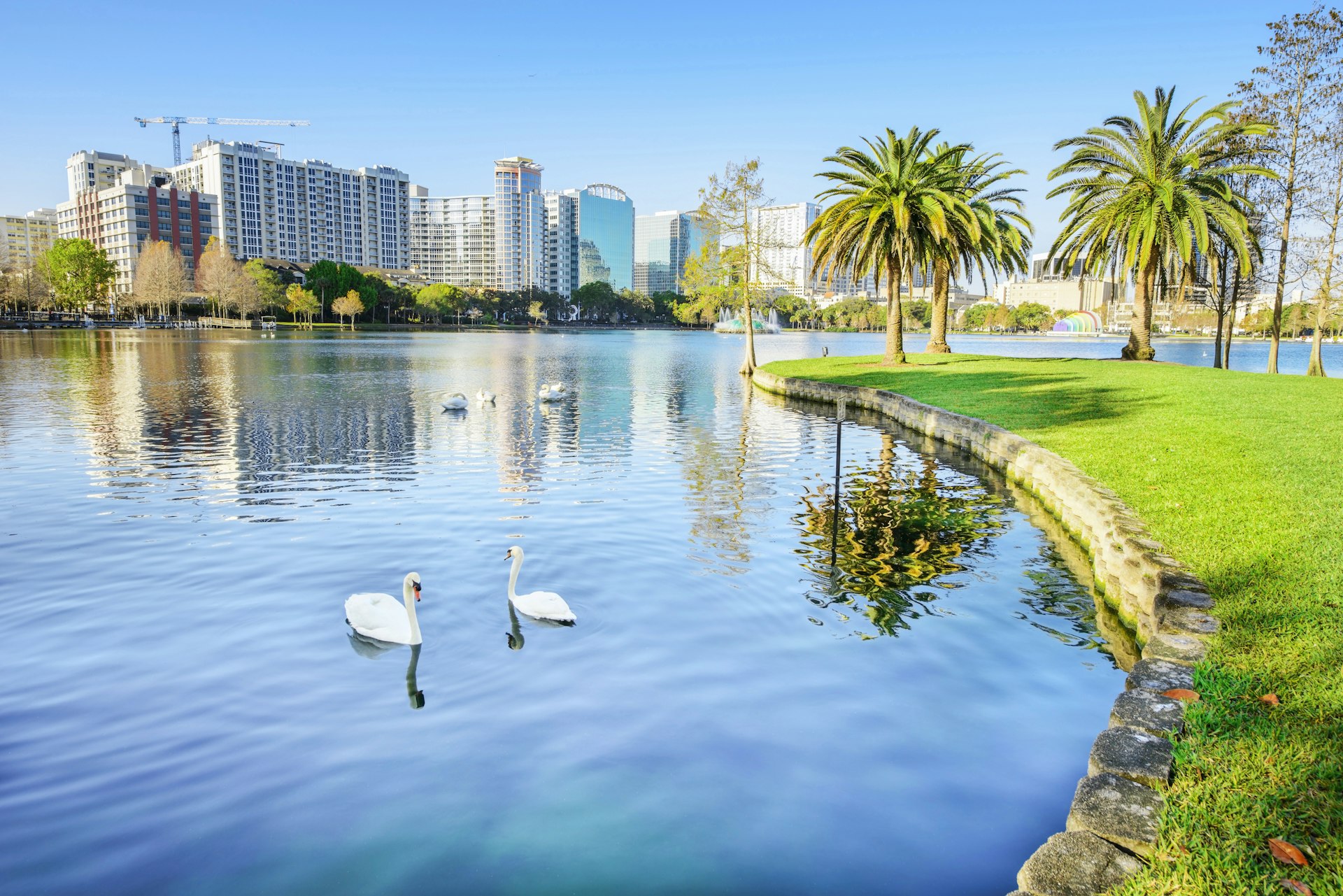
Embrace downtown Orlando
Don’t make the mistake of skipping downtown Orlando on your visit to the Sunshine State. Lake Eola Park is the heart of the city, with a paved, wheelchair-accessible walking trail circling the lake. Colorful gardens blossom against the backdrop of the Orlando skyline while swan boats (and real swans) swim in the water. A wheelchair lift was recently installed to make it easier for people with disabilities to enter the ADA-accessible swan boats. If you’re at Lake Eloa on a Sunday, check out the Orlando Farmer’s Market, where local vendors showcase seasonal produce, arts and crafts, plants and even homemade dog treats.
A whopping 48 Orlando restaurants were honored by the Michelin Guide in 2024, so be sure to arrive hungry. For a bucket list dining experience, the intimate Natsu Omakase has just two seatings per night and flies most of its seafood in from Japan. For a casual meal, it’s hard to beat Super Rico , with Columbian dishes like Churrasco or fried green plantains topped with steak, chicken and mushrooms.
While you’re walking around downtown, keep your eye open for public art. Orlando boasts over 900 paintings, sculptures, tapestries and mixed media displayed in its city hall, neighborhood centers, public buildings and parks.
Visit the Harry P. Leu Gardens
The Harry P. Leu Gardens is a 50-acre plant-life paradise. Since this is Florida, there is always something in bloom, and each trip to the gardens is different than the last. Throughout the year, roses, hibiscus, bananas, tree orchids and citrus trees fill the grounds with perfume and color. This is also home to the Historic Leu House Museum, which was originally built in 1888. Today, the mansion has been restored to offer visitors a glimpse back at the past.
Take in a Performance at Dr. Phillips Center for the Performing Arts
The Dr. Phillips Center for the Performing Arts has been recognized as one of the world's most acoustically sound arts venues. The building takes up two city blocks, offering multiple performance spaces, a school of the arts, event rooms and an outdoor plaza with a welcoming lawn. An ever-changing calendar of performances includes family-friendly programming, Broadway touring productions and local theater groups.
Geek out at Kennedy Space Center
Orlando is only 50 miles from the Kennedy Space Center , and it’s worth a side trip. You can easily spend the entire day there, so don’t short yourself on time. Attractions include encounters with real astronauts, hands-on activities like astronaut training simulators, and virtual reality experiences. Kids love it, and so do adults.
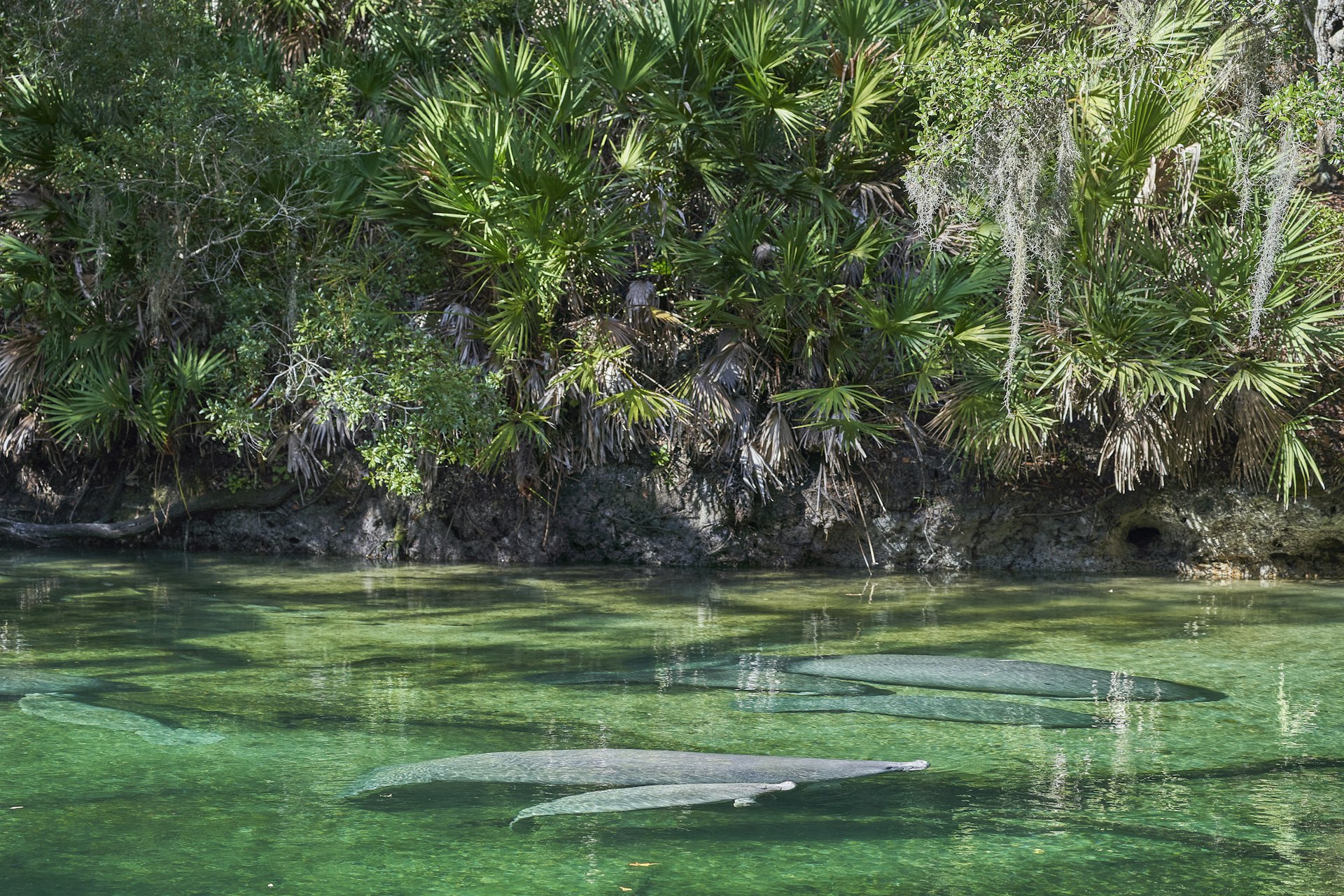
Explore New Smyrna Beach
Drive an hour to New Smyrna Beach, where you’ll find 17 miles of sugar sand beaches, some of Florida’s best surfing waves, and a cute, walk-around-able downtown brimming with boutiques, art galleries and restaurants. Nearby Blue Springs State Park is a designated manatee refuge with hundreds of manatees from mid-November through mid-March that visitors can see via a wheelchair-accessible path and viewing platform.
My favorite thing to do in Orlando
My favorite thing to do in Orlando might seem a little cheesy if you’ve never been inside, but I always recommend Titanic: The Artifact Exhibition . Yes, there are Titanic museums elsewhere, but that doesn’t make this one any less worthwhile since each exhibition holds different artifacts. This one has more than 300 artifacts recovered from the wreckage and 500 personal items from passengers. Costumed actors wander through full-scale room recreations of the Titanic’s interior, pulling you into an eerie, immersive experience. A regular roster of programs includes dinner galas, formal teas and guide tours with rotating themes.
How much money do I need for Orlando?
- Basic room for two: $100 a night (and up)
- Basic Airbnb for two: $100 a night (and up)
- Ticket for Mear Connect: $32.00 roundtrip for ages 10 and up, $26.00 roundtrip for ages 3-9 years old, children under 3 are free
- LYMMO Bus Rapid Transit service in downtown Orlando: Free
- Theme park ticket: varies, but you usually expect to spend at least $120 per person per day
- Cup of coffee: $3.00
- Price for a sandwich: $8.00
- Dinner for two: $60 (and up)
- Cocktail in downtown Orlando: $14 (and up)
Keep planning your trip to Florida:
Keep your wallet happy with the best free experiences Figure out the best time to visit Cruise your way around the Sunshine State with the best road trips in Florida Get the inside intel with the top things you should know before you go
Explore related stories

Apr 14, 2024 • 6 min read
Florida is famous for sun and sand, but for many families it's all about the theme parks. Here's our pick of the best theme parks in the Sunshine State.

Apr 12, 2024 • 5 min read

Apr 10, 2024 • 6 min read

Apr 8, 2024 • 7 min read

Apr 8, 2024 • 6 min read

Apr 6, 2024 • 7 min read

Apr 6, 2024 • 6 min read

Apr 4, 2024 • 6 min read

Mar 26, 2024 • 6 min read

Mar 24, 2024 • 6 min read

IMAGES
COMMENTS
CNN —. One of the most prominent Latino advocacy groups in the United States is urging people to avoid traveling to Florida ahead of a new immigration law that's set to go into effect in July ...
Published April 13, 2023 at 9:36 AM CDT. A national advisory warning immigrants on travel to Florida has been issued by The Florida Immigrant Coalition for what the group said was unsafe conditions for immigrants and their loved ones. "Due to unconstitutional laws being passed in the state aiming to criminalize immigration and invite harassment ...
The Legislature passed Senate Bill (SB) 1718 in the 2023 session, which covers over a dozen policy areas that target Floridians without a documented immigration status. SB 1718 began as a proposal from Gov. Ron DeSantis. Most of his recommendations — except for a repeal of Florida's tuition equity law [1] — made it into the final bill, despite myriad proposed amendments and suggestions.
Florida Gov. Ron DeSantis signed the sweeping anti-immigration bill, which is among the strictest in the country, on May 10. It will go into effect on July 1. Pressure is growing for a boycott of ...
May 19, 2023 / 3:18 PM EDT / CBS/CNN. MIAMI - One of the most prominent Latino advocacy groups in the United States is urging people to avoid traveling to Florida ahead of a new immigration law ...
A travel advisory from Equality Florida does not mince words. In all caps, the subject reads: "FLORIDA MAY NOT BE A SAFE PLACE TO MOVE OR VISIT." The LGBTQ+ civil rights organization joins the NAACP and the Florida Immigrant Coalition in issuing such a warning.. In addition to what some call anti-LGBTQ+ legislation, the advisory cites other bills in the Florida House that "restrict access to ...
A national advisory warning immigrants on travel to Florida has been issued by The Florida Immigrant Coalition for what the group said was unsafe conditions for immigrants and their loved ones.
Thi s law will increase penalties on those who operate a vehicle without a license by increasing the maximum sentence from 60 days in jail to a year in jail for two or more offenses It will also ...
Illegal immigration in Florida:A by-the-numbers look at a surge. Education. The new law repeals a 2014 law that allowed undocumented immigrants to be admitted to practice law in Florida.
JACKSONVILLE, Fla. — Today, Governor Ron DeSantis signed Senate Bill 1718 to combat the dangerous effects of illegal immigration caused by the federal government's reckless border policies.This legislation makes using E-Verify mandatory for any employer with 25 or more employees, imposes enforceable penalties for those employing illegal aliens, and enhances penalties for human smuggling.
The Florida Immigration Coalition also has also issued a similar warning for immigrants. "Travel to all areas of Florida should be done with extreme caution as it can be unsafe for people of ...
Florida sues. Florida sued to halt the policy, and District Judge T. Kent Wetherell, agreed to block the plan for two weeks. Wetherell, an appointee of former President Donald Trump, said the ...
A nonprofit known as the Florida Immigrant Coalition issued a travel advisory against immigrants coming to Florida, as it believes the state is unsafe for people from outside the U.S. The advisory ...
Reconsider travel to Florida due to unconstitutional law that targets immigrant communities and abuse civil liberties. ... Know Your Rights, and be aware that regardless of your immigration status, you have constitutional rights. 1-888-600-5762. Your Rights cuttable cards. English Spanish French Arabic Chinese. Advisory Poster
An LGBTQ advocacy group has issued a travel advisory warning people from coming to the state for business, pleasure or relocation. Equality Florida issued the travel advisory after the passage of what it considers anti-LGBTQ and anti-trans laws, permitless carry, and a possible six-week ban on abortion.
This provision of the law no longer exists thanks to lawsuits filed by immigrant rights groups. The law prompted LULAC to issue a travel warning to Arizona in 2010. The new Florida law "opens ...
Florida has for decades been synonymous with Latin American immigration. Around 1 out of 5 people in Florida is foreign-born. Close to 1 million are undocumented.
David Cruz, a L.U.L.A.C. spokesman, said on Sunday that depending on an individual's immigration status, the organization's travel advisory was either a warning not to travel to Florida or an ...
The announcement came days after LULAC - the League of United Latin American Citizens - issued a travel advisory for Florida after DeSantis signed a new immigration law that will go into ...
Florida lawmakers say SB 1718, a new anti-immigration law set to take effect on July 1, was written to scare migrants from moving to the state. Now, they're trying to convince people to stay.
4100 George J Bean Outbound Parkway. Tampa, FL 33607. (Located on 1st floor baggage claim level - Red) Hours of Operation: 6:00 a.m. - 10:00 p.m., Monday - Friday (Closed Weekends) Contact Information: (813) 676-4929, [email protected]. Treasure Coast International Airport (FPR) Address:
Tampa Station, 3811 Corporex Park Drive, Tampa, FL 33619. Marathon Station, 3770 Oversees Highway, Fat Deer Key, Marathon, FL 33050. West Palm Beach Station, 3301 Lake Shore Drive, Riviera Beach ...
Completing an Unprecedented 10 Million Immigration Cases in Fiscal Year 2023, USCIS Reduced Its Backlog for the First Time in Over a Decade. U.S. Citizenship and Immigration Services (USCIS) is releasing end of fiscal year (FY) 2023 data that illustrates the agency's progress in meeting its strategic priorities.
Immigration How to check if you won one of the 55,000 U.S. green cards in the 2025 visa lottery
Gov. Ron DeSantis has said he has "no plans" to call a special session on immigration, abortion or any other topic. ... 🌴 Explore Florida travel magazine Opinion | ... Florida Gov. Ron DeSantis ...
Florida and the federal government squared off this week in an appeals court about whether the state could legally challenge Biden administration policies that led to undocumented immigrants being ... Attorney General Ashley Moody have made a high-profile issue of criticizing the Biden administration's handling of immigration issues, but the ...
Concerns over illegal immigration and border security was central to Trump's 2016 campaign, when he won the presidency and polls show it remains the Republican Party's most potent political ...
The governor says he supports stricter immigration laws for the Sunshine State. ... of the 2024 Florida Legislative Session Calls mount for ... Auto Insurance Pet Insurance Travel Insurance Credit ...
There's a reason 75 million people visit Orlando annually, and it isn't just the mouse. Don't get us wrong. Disney World is incredible and deserves a place on any theme park lover's bucket list, but Orlando is so much more than its theme parks. It's an ever-evolving city with vibrant parks, public art and award-winning restaurants.
Florida saw a noticeable uptick in overseas tourism in 2023. As the recovery of international travel continued, Florida garnered 25.2% of the overseas market share of travelers to the U.S. In March 2024, overseas visitation to Florida surpassed pre-pandemic levels for the first time, with a 1.7% increase compared to March 2019.